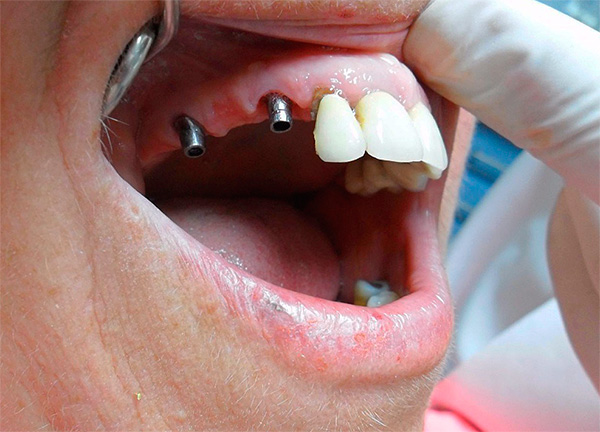
Next you will find out:
- What are the general complications after the implantation of teeth you can wait on the way to restore the ability to chew normally and a beautiful smile;
- What problems sometimes arise directly at the time of the operation, and which - in a few days, weeks, months and even years after the implants are installed;
- A list of contraindications for implantation and their relationship with the development of dangerous complications;
- How to recognize the problem in time - what is considered a harmless side effect, and what is a dangerous complication;
- How to protect yourself from possible troubles;
- What types of implants are characterized by the lowest risk of complications;
... As well as other interesting practical points of view concerning possible complications of dental implants.
Unfortunately, the permanent teeth of a person, in the event of their loss or serious damage, are not able to recover on their own and require artificial replacement,as the violation of the chewing function not only causes significant damage to the digestive system, but also negatively affects the quality of life in general. In order to restore aesthetics and the normal chewing of food, dentists began to use the first, then still primitive, dental implants made of wood, various metals, porcelain and other available materials at the end of the XVIII - beginning of the XIX centuries. However, very frequent complications after dental implantation operations forced doctors to constantly look for new technologies and more advanced materials suitable as implants.
Due to such continuous research and successful experiments of doctors who are supporters of dental implantation, already at the end of the last century, this trend in dentistry became one of the most popular and sought after by the general population. The most important result of such hard work was that the complications after dental implantation ceased to be regular and quite expected., and dental surgeons have learned in varying degrees to minimize damage to health even in the event of certain problems.
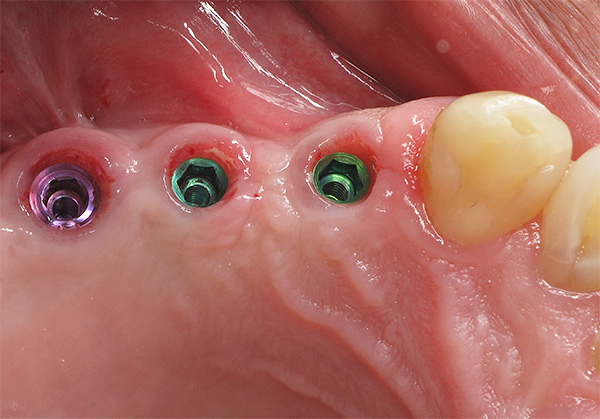
Currently, prosthetics on implants are gradually replacing the “ordinary” prosthetics of teeth, often requiring to grind healthy teeth, or to use partial or full removable dentures, which are often called “false jaws”.
However, is it possible today, when it is already the 21st century, to say with full confidence that the complications after dental implantation and the corresponding risks of problems appearing during and after the operation have completely gone into the distant past? Well, the answer here is quite unequivocal, and, unfortunately, is negative - complications are still often encountered in the practice of implantologists. But why?
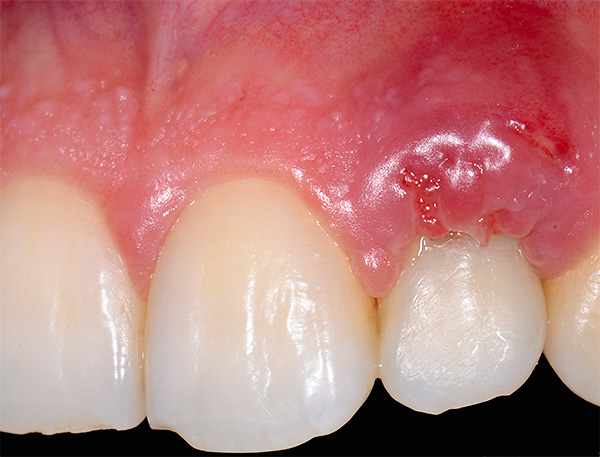
In connection with the proliferation of numerous implant systems, various methods and technologies of implantation, as well as the preparation of many hundreds of practicing maxillofacial surgeons in our country alone, at least 20,000 implants are installed each year. And at the same time, the number of unsuccessful operations and negative reviews on the Internet quite naturally increases - problems can begin due to the fault of an insufficiently qualified doctor, due to the choice of poor-quality implants (rarely, but sometimes), as well as the fault of the patient of the dental clinic.
About how to minimize the risk of problems with dental implants, how to avoid the most frequent problem with implants - their “rejection”, and what to do if problems are still outlined - that’s about all of this we’ll talk more about ...
Complications that may occur during the dental implantation procedure itself
It is useful to keep in mind that some complications can occur directly during the procedure of implantation of teeth, directly on the dental chair. Moreover, the nature of undesirable consequences may depend on whether an implant is installed on the upper or lower jaw.
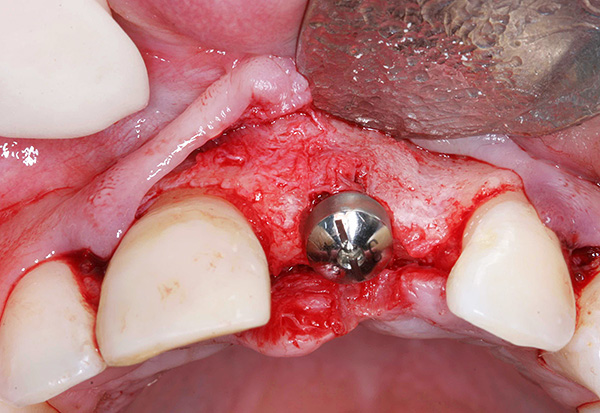
Below is a brief list of possible complications that may arise during the implantation procedure (in decreasing order of the frequency of their occurrence):
- Heavy bleeding;
- Pain;
- Perforation of the bottom of the maxillary sinus and nasal cavity;
- Damage to the wall of the mandibular canal and nerves of the mandible.
Let's look at these complications in order.
Heavy bleeding
During implantation of teeth, a small bleeding is considered normal, and in most cases it is easily eliminated by conventional hemostatic techniques.Excessive bleeding can occur either through the fault of the doctor or the fault of the patient himself.
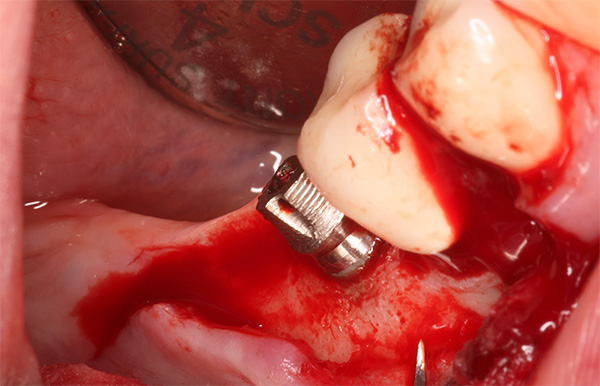
In the forces of each person sitting in the dental chair, reduce the risks of developing this complication. Most often, bleeding from a wound occurs when blood pressure rises, as well as when blood clotting is disturbed (taking blood thinners, cardiovascular pathology, etc.).
Control of blood pressure, timely administration of drugs under the control of a cardiologist or therapist, correct medical and psychotherapeutic sedative (relieving nervous tension) training, as well as mandatory informing the dentist-implantologist about existing diseases will allow you to avoid not only early bleeding during implantation, but also during the delayed period. Equally important for the prevention of complications is also the implementation of all recommendations after dental implantation, when a fresh wound is a zone of increased attention, especially if more than 4-5 dental implants were installed in one day.
From the practice of the dentist
Bleeding through the fault of the dentist occurs much less frequently.than most people think (after all, what thoughts may arise in a patient: “Here, the whole jaw was opened to me, now the blood does not stop, couldn't it have been more careful to cut it ...”)
However, doctors who are just starting their activities in the field of implantation of teeth and stuffing their first bumps do sometimes have unpleasant flaws in their work. However, even with the assumptions of inaccuracies during surgery, even a not very experienced surgeon can easily use modern hemostatic techniques and means to eliminate the negative consequences. Only injury to large vessels that are deep in the jaw, for example, with an incorrectly selected implant, can pose a threat to the patient's life, but this is very, very rare (almost impossible).
Pain during dental implantation
Sometimes during the procedure of implantation of teeth, quite strong painful sensations can occur, which, however, are usually easily eliminated with an additional portion of anesthesia.
But in rare cases it happens that anesthesia does not work well. This is most often associated with the individual characteristics of the person.This situation is resolved simply: the implantation of the teeth is carried out under general anesthesia, in other words, when consciousness is turned off.
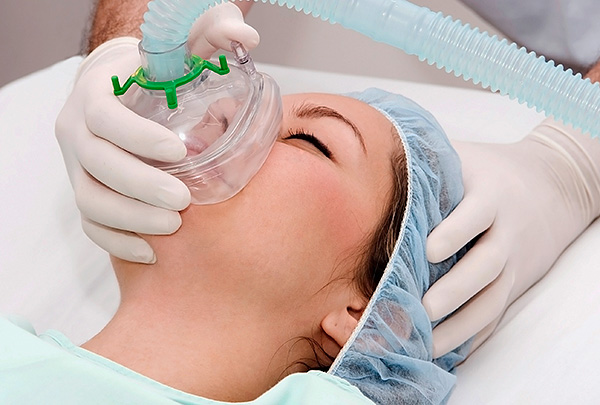
Therefore, if you are injected with an anesthetic, but the pain is still there, you do not need to endure and be silent - you must and immediately tell the doctor about it.
Perforation of the bottom of the maxillary sinus and nasal cavity
Currently, this complication of implantation is much less common than before. Progress has occurred largely due to the ability to accurately determine the distance to abdominal formations using panoramic images and computed tomography (CT).
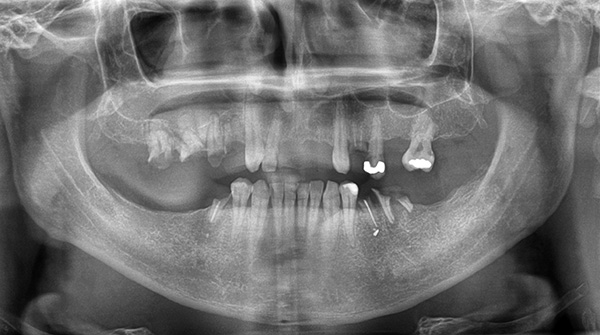
In order to reduce the risk of this complication to almost zero, it is necessary to trust only an experienced doctor with great experience, and if in doubt, consult with other implantologists. In the case of a close location of the maxillary sinus and the bottom of the nasal cavity, bone buildup can be performed (sinus lift), and then problems do not arise.
The photo below shows an example of bone graft before implantation of a tooth:
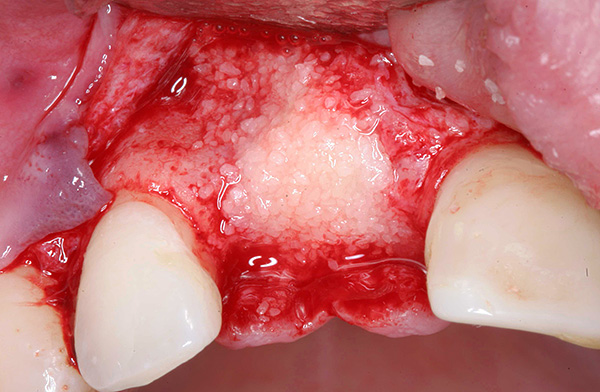
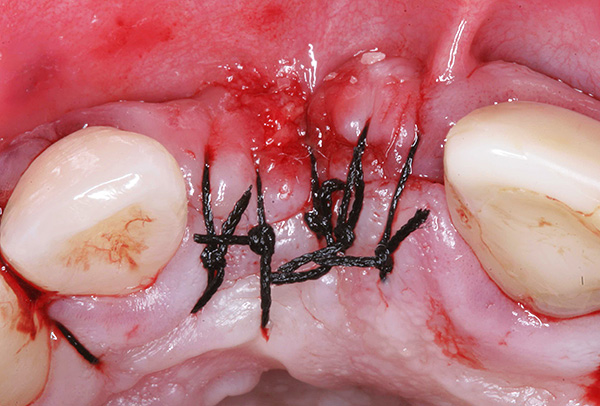
Damage to the wall of the mandibular canal and nerves of the mandible
This complication during the implantation of teeth does not always have long-term negative consequences, since, despite the frightening name, in fact, it usually manifests itself only by numbness in the lower jaw (the lips most often numb). Even without treatment, these symptoms can go away on their own within 2-3 weeks, with a maximum of 2-3 months.
In addition, it should be borne in mind that the feeling of numbness on the corresponding side of the face may also be a consequence of squeezing the nerve in the mandibular canal. This sometimes occurs as a result of bleeding in the bone marrow spaces - blood can flow not only in the direction of the oral cavity, but also gradually move through the bone spaces, because the intraosseous jaw tissue is not “whole-cast”, but cellular. The entry of even a relatively small amount of blood into the area of the mandibular nerve in the canal creates a temporary compression. Gradually, blood masses dissolve, but it takes time when the nerve recovers from such a squeezing effect (usually no more than 5-7 days).
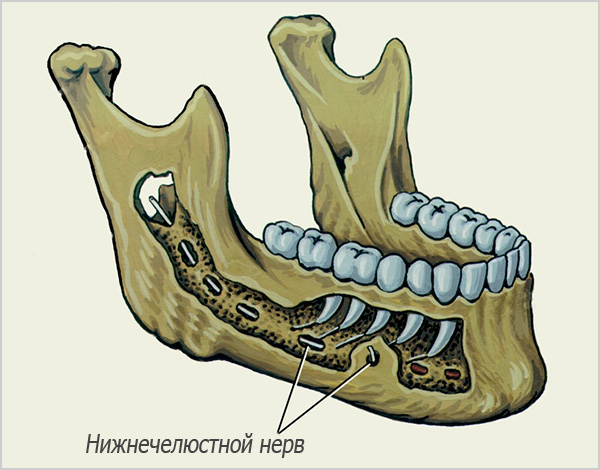
On a note
Complications such as a fracture of an instrument during an operation, a fracture of the wall of the alveolar process, insufficient fixation of the implant, pushing it into the sinus of the upper jaw, etc., are even less common.The myth that a dental implant can crawl out of the eye or appear from the jaw through the cheek causes some people to be terribly afraid of implantation. In fact, no doctor in his right mind would consciously harm your health using implants of the wrong length, and thoughtlessly screw them in "as far as it will go." Therefore, this situation can only be viewed in terms of popular horror films.
What complications sometimes occur after the implants are installed
Complications after the installation of dental implants can be divided into early, which manifest themselves within a few days after surgery, and late, occurring after weeks, months, and sometimes even years after implantation.
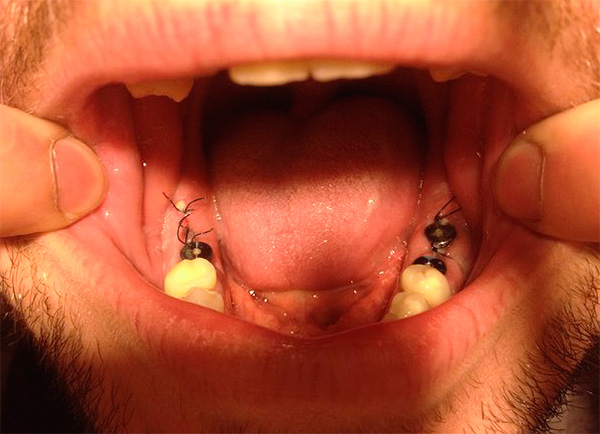
Early complications include:
- Painful sensations;
- Edema;
- Bleeding;
- Fever;
- The divergence of the seams.
Generally speaking, pain is a normal reaction of the body in response to the traumatic intervention of the dentist-surgeon during the implantation of teeth, and such pain appears after the termination of the anesthesia.
Analgesics prescribed by a physician usually effectively relieve pain, and the engraftment process does not bring too much discomfort to the patient.Normally, the pain should not be disturbed for longer than 2–3 days, during which medication is indicated. If pronounced pain lasts longer - this is an alarming sign.
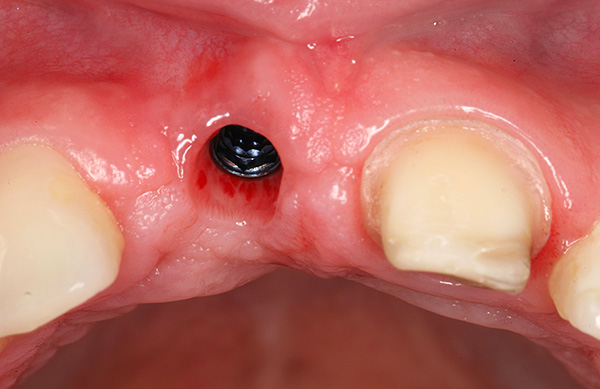
Swelling of the soft tissues are the result of virtually any surgical procedure, including dental implants. Moderately pronounced edema is a natural reaction of the body to injuries and “invasion”, in general, an alien implant, and rarely lead to complications. Usually, tissue swelling lasts no more than 5-7 days.
A possible complication in the form of an excessive increase in edema can be prevented by applying a cold immediately to the area of the face where the implants were placed after the operation. At the same time, care should be taken and adhere to elementary common sense so as not to cause frostbite and tissue necrosis (and that is, comrades who just take something icy from the freezer, put it on their cheek and hold it for two hours - this is wrong and very dangerous) .
Weak bleeding in the area of dental implants can be observed within a couple of hours after implantation, when the vasoconstrictor effect of adrenaline added to the anesthetic ends.Even if such bleeding is delayed for the whole day - this is not a cause for concern. It is important to distinguish between the blood (bloody fluid) from the strong and incessant for more than 5-8 hours of bleeding, which does not stop.
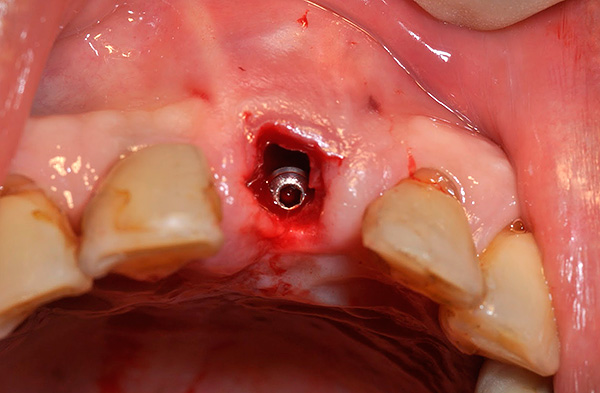
Important:
It should be remembered that a common cause of bleeding is the inattention of the person to the problems. For example, taking aspirin and a number of other drugs worsen blood clotting, and increased blood pressure prevents clot formation in the wound; A number of diseases of the cardiovascular system make virtually all home remedies to stop bleeding almost ineffective. It is important to always timely and correctly assess the scale of the problem and notify your doctor in advance of such nuances.
As for a slight increase in body temperature after implantation, this is also a completely normal reaction, which reflects a particular stage of the local inflammatory process after surgery. On the first day, the temperature can even rise to 38.0 ° C, but do not worry - the problem is solved with the help of antipyretic drugs, which the doctor himself will most likely mention.
However, if, say, closer to the night, the temperature on the first day after implantation “has passed” far beyond 38 degrees, and the antipyretic drugs do not help, then it is advisable to call an ambulance, make a lytic mixture, and consult with your dentist in the morning. may be a sign of complications after dental implantation.
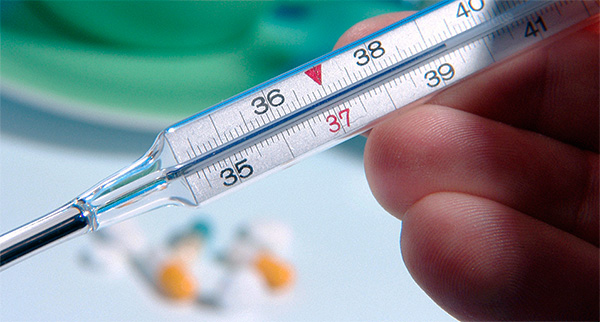
Most often, the temperature does not rise to such high values, but can stay within 37.0-37.3 ° C for several days, which is a reaction of the organism that is within the normal range.
Perhaps it is worth mentioning also the divergence of the seams, often imposed on the wound after implantation. The photo below shows an example of the normal state of the sutures immediately after surgery:
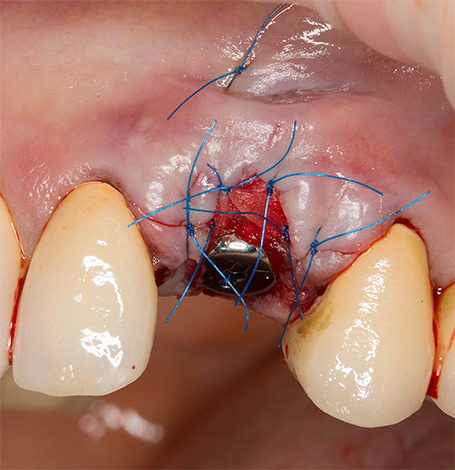
The divergence of stitches, as a complication, is almost never a sign of unsuccessful dental implantation, since it more characterizes the result of a person’s behavior. Violations can be very different: from non-compliance with the principles of oral hygiene and ignoring the recommendations of the doctor, to the unauthorized "hicculation" in the oral cavity with fingers, toothpicks, etc., which leads either to mechanical damage to the seams or contributes to the onset of the inflammatory process. This provokes the divergence of the seams in the future.
Late complications
Among the late complications, which sometimes arise after a long period of time after implantation of teeth, the following can be distinguished:
- Periimplantitis;
- Implant rejection.
These complications can occur regardless of whether implants were installed on the upper or lower jaw, there are several or only one delivered, whether the implants are expensive or not. The risk of rejection and periimplantitis (inflammation in the area of the implant) is always present, although, of course, quite certain factors influence the likelihood of such an unpleasant outcome.
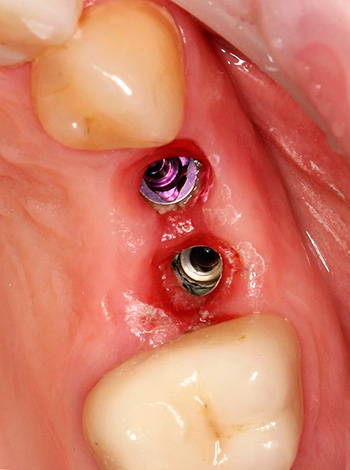
Popular medical forums, where many reviews of people about the results of dental implants are published, are often replete with descriptions of various problems after seemingly successfully installed implants. Moreover, violations associated with the "engraftment" of implants are usually among the first.
In fact, periimplantitis and rejection of implants are not very common today, as one would think after reading the relevant negative reviews. Each large clinic keeps official statistics on its unfortunate cases, and the percentage of rejection from all registered implants is no more than 3-5%.
And often in such cases, there are people who were warned about the risks of rejection of dental implants in connection with the existing contraindications, or who regularly violated recommendations for their care of prosthetic implants and had bad habits.
On a note
Periimplantitis is an inflammation of the tissues surrounding the implant. An infection that has gotten in case of non-observance of hygiene (most often) or in violation of the implant installation technique (extremely rarely) can literally eat away the bone, leading to swelling, suppuration and severe pain. This complication is sometimes accompanied by the appearance of unpleasant odor in the area of the implant.
Further progression of periimplantitis in the case of failure to provide timely assistance leads to rejection of the implant - in such cases it is better to remove it immediately, without waiting until the inflammatory process leads to much more serious complications.
Implant rejection is often accompanied by its mobility and soreness under load (with pressure). However, modern dentistry allows sometimes to solve even this, at first glance, the most terrible for many patients, problem.However, we are not talking about the fact that the rejected implant will safely take root after some doctor's manipulations - no, it usually needs to be removed and re-implanted.
The photos below show the removed implants:
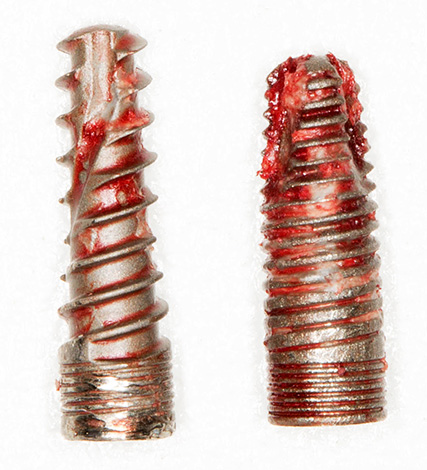
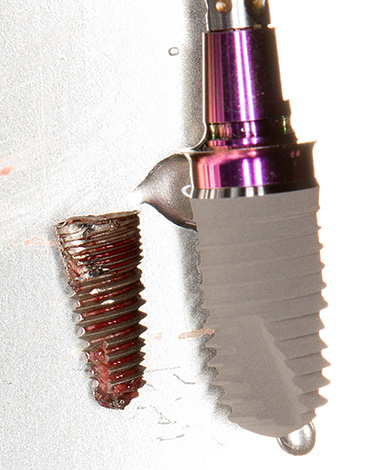
After removal of the movable implant, the procedure of complex preparation of the well for the next implantation is carried out, which can be carried out after 1-2 months. For example, with a significant loss of bone tissue or proximity to the maxillary sinus, it may be necessary to build the jaw bone under the dental implant (sinus lift surgery).
Indications and contraindications for implantation of teeth and their connection with possible complications
The indication for implantation is the absence of one or several teeth, as well as the impossibility of classical prosthetics. However, errors and complications during the implant installation occur most often among those dentists who are guided more by indications, rather than taking into account contraindications to implantation (sometimes this approach is due to commercial considerations, because no one wants to lose “expensive” patients).

Absolute contraindications for dental implantation:
- Chronic diseases in the decompensated stage;
- Serious disorders of hemostasis;
- HIV and a number of other seropositive infections;
- Some mental illnesses.
Relative contraindications:
- Diseases in the acute stage, especially acute viral infections;
- Chronic infectious diseases;
- Condition after heart attack and stroke;
- Pregnancy and breastfeeding;
- The risk of bacteremia in patients with prosthetic heart valves who have had rheumatism or endocarditis;
- Exacerbation of chronic forms of the disease;
- Treatment with drugs that worsen tissue regeneration.
Relative contraindications entitle the doctor to delay the procedure for implantation of teeth. For example: after a full cure of a viral disease, one year after a heart attack, after the end of breastfeeding, stopping drugs that create risks of complications during and after implantation, etc. All this is necessary to minimize the risks of developing negative consequences when implantation of teeth.
It is interesting
More recently, diabetes mellitus was an absolute contraindication to dental implantation.But at the moment it has been proved that diabetes mellitus of the second type in the compensation stage does not affect the course of implantation and does not create the risks of implant rejection. However, the operation takes place under the strict supervision of an endocrinologist with mandatory monitoring of blood glucose levels (significant fluctuations in glucose are unacceptable).
Some people who by all means want to get a beautiful smile as soon as possible after dental implantation sometimes have reasonable questions:
- Or maybe you can still do implantation of teeth during pregnancy?
- And during the acute infection process?

So, simultaneous removal and implantation of teeth during pregnancy can in some cases have serious negative consequences for the fetus, and it is difficult to imagine such a situation when the operation is well, just urgently needed. Better yet wait. Pregnancy itself does not affect the process of “engraftment” of implants, but drug therapy, which is necessary after their installation, can have a negative impact on the developing fetus.
Even in the event of an emergency, such as an acute injury that led to a fracture of a tooth or root and its subsequent removal, during pregnancy you should not be in a hurry with implantation.It is clear that the aesthetic problem that arose in a young girl can lead to stress and a nervous breakdown, but the health of the unborn child should come first.
As for implantation in acute infectious processes - due to the effect of infection, the body is weakened, and there is an increased risk of periimplantitis when installing implants at this time. However, this does not mean that it is impossible to put implants in the hole of a tooth removed because of the exacerbation of chronic periodontitis. Adequate drug therapy, competent selection of the system and technology of implantation can, of course, minimize the risks of complications even in such extreme cases, although in general it is unwise and dangerous to ignore contraindications, especially when this is done by a doctor only for commercial gain.
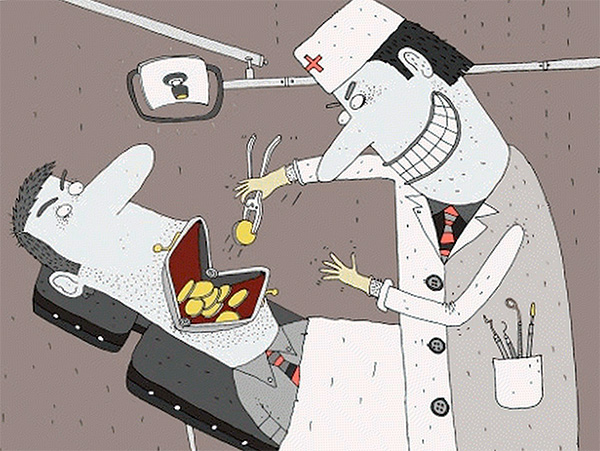
How to recognize the problem in time: from innocuous side effects to dangerous complications
Despite the attendant risks, a huge number of people all over the world place implants, get a Hollywood smile and the ability to chew food normally. With regard to possible complications - someone lucky more, someone less,However, the positive effect of implantation directly depends not only on the professionalism and intuition of the dentist-surgeon, but also on the patient himself.
Not every person has the knowledge that allows them to recognize the problem in time and to direct the situation in their favor in a timely manner. And if we paraphrase a well-known saying, then we get a kind of formula for a successful rehabilitation period after dental implantation: "Who owns the information - he owns the situation."
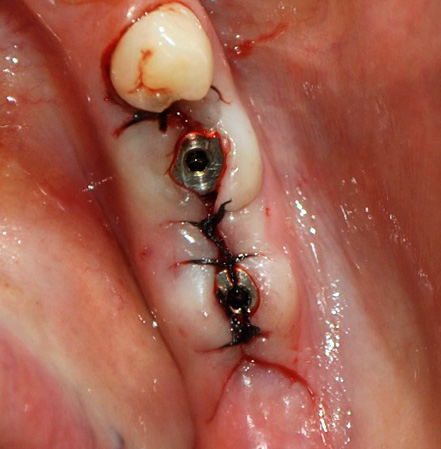
Suspicious symptoms most often occur on the day of implantation or within 1-2 days after it.
Side effects can be observed even after the jaw bone has grown under the dental implant, which, however, does not always indicate the possibility of developing a dangerous complication. Sinus lifting is performed with a good purpose, for example, to increase bone tissue near the bottom of the maxillary sinus, so that during the installation of the implants do not perforate it.
In general, bone grafting is almost always transferred favorably, often it is carried out simultaneously with the installation of the implant.But sometimes there are completely harmless side effects temporary disguised as complications that can scare.
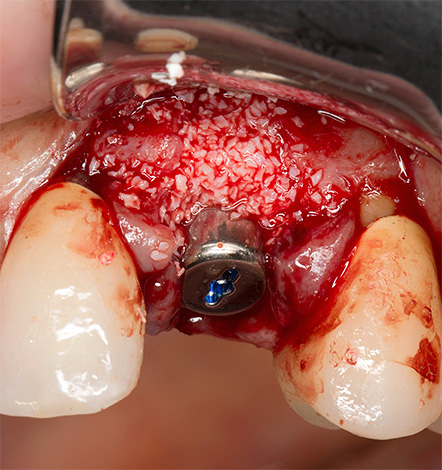
For example:
- Temperature increase to 37.5 degrees;
- Feeling of heaviness in the maxillary sinus;
- Swelling of the face;
- Small hematomas.
The fact is that the tissues of the maxillofacial region have abundant blood supply (especially for the lower jaw), and almost any surgical intervention can be accompanied by phenomena that sometimes even scare the informed patients. However, the frightening appearance of edema and hematomas in 90-95% of cases in no way corresponds to their real danger - that is, it looks all scary, but it is not dangerous to health and does not lead to serious complications.
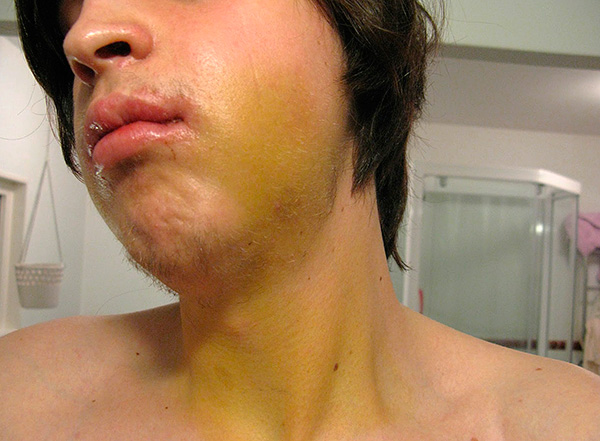
A decrease in the severity of such edemas and hematomas is observed already in the first days after the implantation of the teeth (and sinus lift), and finally they usually disappear in 1-2 weeks.
In general, any surgical methods of dental implantation, as well as the stages of bone grafting, are not without side effects, although in most cases it is not reasonable to consider them as complications.
How to distinguish the harmless symptoms that have arisen after the implantation of teeth, from developing a dangerous complication? Here are some examples:
- Pain.As noted above, this is a normal reaction of the body to a traumatic intervention, as a rule, easily removed by painkillers. They are prescribed by the doctor after dental implantation or sinus lifting. But if severe pain accompanies healing for more than 3 days from the moment of implantation, then a complication can be suspected.
- Edema is also a common result of the inflammatory process, occurs 2-3 hours after the intervention. Within a week, swelling of the maxillofacial region passes by itself. In the case of their preservation after 7 days from the moment of implantation of the teeth and, especially, with an increase in size, it is necessary to urgently consult a doctor.
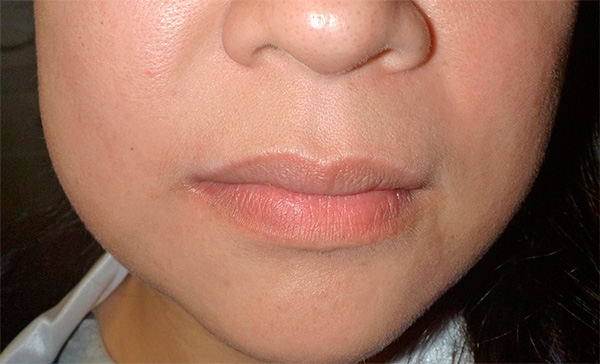
- Bleeding. Intensive bleeding within 8-10 hours after dental implantation most often indicates a bleeding disorder or problems in the work of the cardiovascular system. If we exclude these basic causes, the blood almost always stops safely. The exceptions are injuries of large vessels made during implantation, but such complications are extremely rare and manifest severe bleeding starting from the first day of surgery and more than 5-7 days with the formation of large hematomas.
- Temperature rise. Just like after a sinus lift operation, an increase in body temperature, even up to 37.5 for 2-3 days, is normal. In rare cases, the temperature on the day of implant installation may rise to high values (above 38.5), especially after implantation of more than 6-8 dental implants, but this is not the result of complications or mistakes made during the operation, and in 90% of cases - an individual body reaction. You can suspect a serious complication if the temperature not only does not decrease within 3-4 days, but is also prone to a slight increase, and purulent discharge has appeared in the places where the implants are installed (pus can have an unpleasant smell).
- Loss of sensation in the face. Loss of sensitivity of a part of the face is a rather unpleasant, but not very often observed complication after dental implantation. Usually the reduced sensitivity lasts no more than 3-5 days. If during the implantation the dentist-surgeon made a serious damage to the nerve, then his independent recovery sometimes ends only within 4-6 months. Recovery can be accelerated by physiotherapeutic methods of treatment and drug therapy, without surgical intervention.
Sometimes the appearance of an unpleasant putrefactive smell in the area of a recently installed tooth implant leads patients to the idea that a serious problem has arisen - perhaps a rejection has occurred, because “something is rotting and decaying there” ...
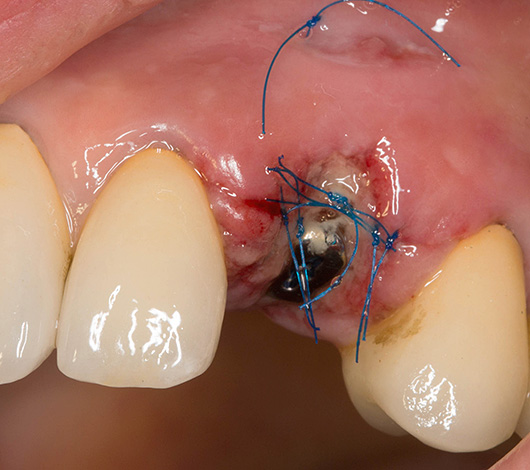
In this case, it is useful to know a number of quite characteristic signs that really warn of the beginning of the rejection of implants:
- Heavy bleeding for more than 3-4 days;
- Increased edema and its preservation over 2-3 weeks;
- Gradual increase in pain within 2-3 days after the implantation of teeth;
- The feeling of "stirring" of a foreign body in the mouth, where they put the implants.
But as for the appearance of bad breath - everything is not so clear. Such a smell can be caused both by the formation of pus (which may indicate a serious complication), and by the completely natural bacterial degradation of organic matter, sometimes even under the plug of an implant.
How to prevent negative consequences after implant implantation?
We note a number of simple rules, following which you can not only significantly reduce the risk of complications after dental implantation, but also in some cases speed up the implant engraftment process, making it as comfortable as possible.
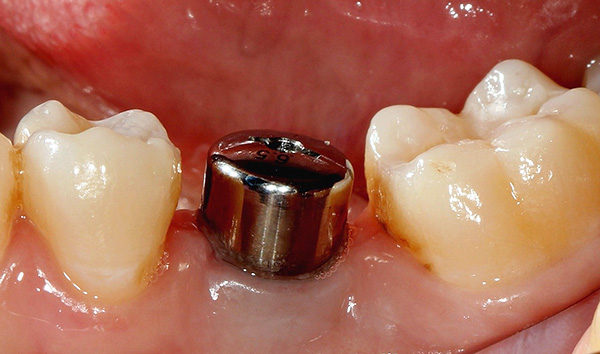
Here are the rules:
- Take medications recommended by your doctor (antibiotics, antihistamines, painkillers, etc.) promptly and correctly;
- Responsibly approach mouth rinses with antiseptics;
- Visually and sensibly monitor the condition of the installed implants and care for them after implantation according to the scheme prescribed by the doctor;
- Do not smoke at least 1-2 weeks after surgery (in some cases it is required to completely give up this bad habit);
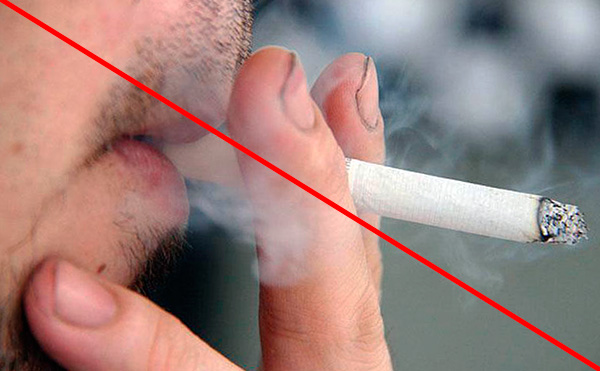
- Limit chewing on the side of implantation (if indicated).
It should be borne in mind that only a dentist can choose for you an adequate course of taking drugs, based on your individual characteristics and associated diseases. Therefore, an independent choice of a home treatment method and a drug can be fraught with undesirable consequences (for example, some comrades strive to spread some ointments on the gums: Metrogil Dent, dental adhesive paste Solcoseryl, or others, although this is not always desirable).
It is important to know
Until the seams are removed, the ideal food is boiled vegetables, light warm soups, and fish dishes (boneless).But hard, sticky, floury and especially spicy and hot dishes can contribute to the development of inflammation in the area of implants.
After installing crowns and bridges on implants, it is important to care for them carefully and regularly. Twice a day, you need to brush your teeth and once - interdental spaces. Where the implant is in contact with the gum, it is recommended to clean it in the evening from plaque and food debris with a soft brush for interdental spaces.
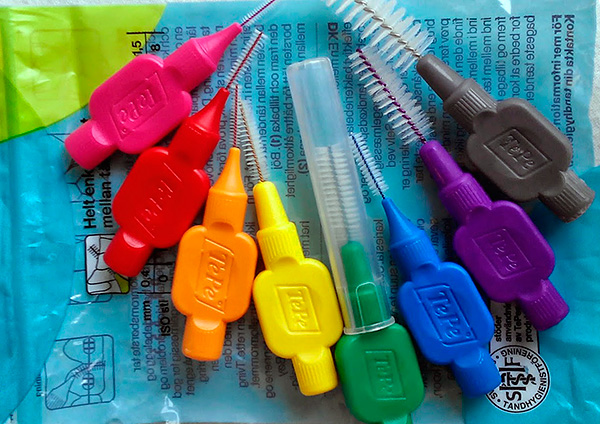
Well, and of course, to avoid complications helps the correct choice of the dental clinic, taking into account the reviews have already visited her patients. In addition to the clinic itself, not less, and even more attention should be paid to the choice of a particular doctor who will perform the work, because the final result directly depends on his qualifications.
What implant systems are characterized by minimal risk of complications?
At the moment there are more than 300 types of dental implants, which differ from each other in many ways. However, among all this diversity there are no such implants, which would be characterized by zero risk of possible complications after their installation.
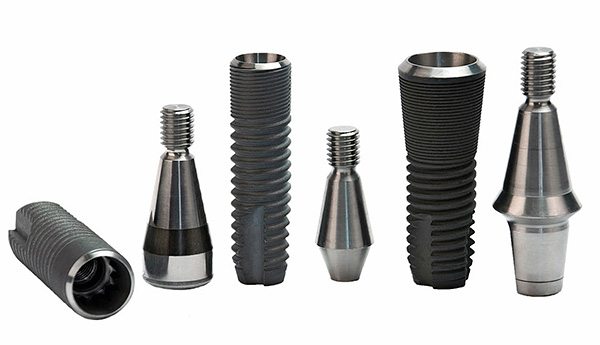
Meanwhile, there are several really well-proven systems that are rarely rejected with proper and professionally performed implantation technology (and the corresponding statistics confirms this well).
You can choose the safest implant system, taking into account 5 main selection criteria:
- It is highly desirable that the titanium from which the implant is made has a high degree of purification;
- It is desirable that the surface of the implant be both macro- and micro-threading;
- The presence of a tapered abutment and implant joint. Conical connection ("Morse cone") is currently one of the most reliable types of articulation and allows you to extend the life of the implant;
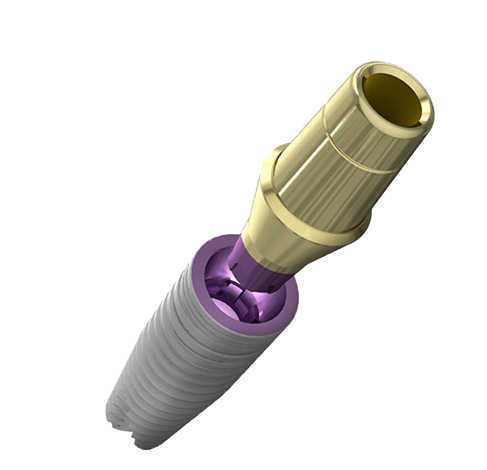
- Long-term manufacturer's warranty for the implant system. Some manufacturers offer a lifetime warranty on their products, which testifies to the proven quality of materials over the years and the minimal risk of complications when working with similar products;
- The lifetime of the brand on the market. The longer the implant system exists in the dental market, the higher the chance of getting a truly high-quality product.
At the moment, dental implants from Sweden, Switzerland and Israel have proven themselves from the best side for all these 5 criteria. At the same time, more and more cheap analogues of Asian origin from firms that have neither a long history nor sufficient experience in using their products appear in recent times. The low price of dental implantation with the use of such analogs may hide the big risks of complications, for which some clinics are not always ready to be responsible.
Therefore, in order not to become the hero of the well-known saying “Miserly pays twice”, one should take the most responsible approach to the choice of the clinic, doctor, company of the implant manufacturer and the rehabilitation period after the operation. Then the result of dental implantation will be really high-quality treatment without any unpleasant complications.
Be healthy!
Interesting video about possible complications that sometimes occur after dental implantation
Implantation or classical prosthetics - what should you choose? ..

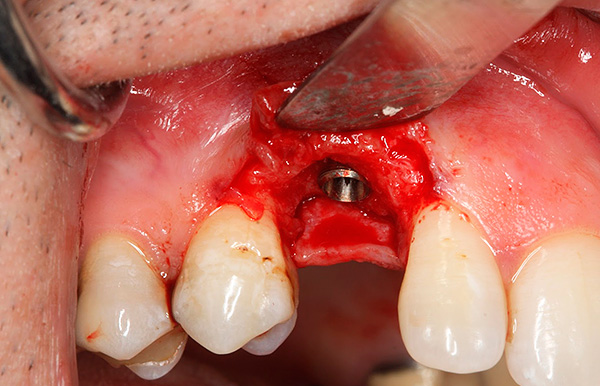
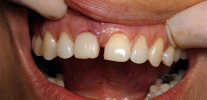

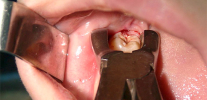
Hello! I lost the taste after the operation. Ultrasound and other studies have shown that everything is normal. Could it be after dental implantation? If, yes, how to treat?
Hello! The loss of taste in you is unlikely to be associated with nerve damage during surgery (implantation), since the nerves that are responsible for the taste sensation do not pass close to those areas where the implants are installed.In extreme cases, sometimes there is a loss of sensitivity in certain parts of the face (including due to edema), but all this cannot be the cause of the loss of taste.
In rare cases, loss of taste after dental intervention is observed due to the impact on the lingual nerve during anesthesia. Over time, this passes.
Be that as it may, it is important to accurately diagnose, and only after that take action. To begin, I recommend consulting a neurologist for advice.
Oh god! Doctors, it turns out, too, suspicious! “The patient thinks that the doctor broke his whole jaw, and he could have cut it more carefully!” I, as a patient, would have thought the following: for me a room was prepared, at least two people gathered to perform the operation, and I shandril, scared, summed up. The blood is coming, they cannot continue ...
Hello, recently installed implants, crowns have already been installed on them. I want to know whether it is necessary to take care of them in a special way, or as for ordinary teeth? What care products are best?
Hello, Alina. Of course, the issue of hygiene is very important, since any orthopedic structures require even more careful care than their teeth. It is necessary to brush your teeth 2 times a day, using, for example, Paradontax toothpaste. After 2 weeks after installing the crowns, you can use irrigator.
Hello. I had two implants in my lower jaw on my left side 6 days ago. In the clinic was on the reviews. Until now, the 6th day there is pain, forced to take painkillers (3-4 times a day), and the pain comes from the tooth adjacent to the implant - 4-ka on the left lower jaw. Appealed to the surgeon who performed the installation. I was going to take off one of the implants, voiced that the nerve could be transferred by this implant. But during the consultation the doctor himself doubted whether to remove the implant or not. He let go home, said to watch a couple of days, the pain would be eliminated or not.
What do i do? What diagnostics exist to understand whether a nerve is affected by an implant or not? At this point in time (6th day), the swelling of the cheek on the left almost subsided, there is no numbness in the lips.But there is almost constant aching pain in the area of the 4th tooth in the lower jaw on the left. Implants are instead of the 5th and 6th teeth on the lower jaw on the left, next to the 4th, which painfully hurts.
I am in an uncertain state and situation.
Hello Renata. In such a situation, it is advisable to conduct additional research - computed tomography (CT), in order to understand - the area around the implants or the nearby tooth hurts.
Implants in the area of 5-ki and 6-ki are really close to the chin nerve and, possibly, during the installation it was transferred. A problem is also possible in the 4-ke itself. If the cause is 4-ke, then tooth treatment will be required. If the problem is in implant, then it can be removed, wait a month, wait for the removal of inflammation and then reinstall.
Hello, on January 29, I was put three metal caps on the implants: on the left 5 and 6, on the right 6. Implants were installed three months ago, everything was fine, no problem. It seemed to me that the crowns - this is nonsense, but it turned out the opposite. Already when I came to the installation of the abutment and the removal of the casts, there was a strong pain on the left when screwing the abutment, I even jerked.The doctor said it was gum, but it seemed to me that the pain was inside, deeper. In the evening I even drank the ketans.
In the morning everything was fine, the pain went away, but a week later, when I arrived at the installation of the crowns, the pain appeared in the same way. I asked the doctor why it hurts so much? He again said that it was gum, that everything would pass by in the evening! But today is 31.01, i.e. Two days have passed, and I have all the whining and whining, and it hurts 4, my next tooth, but not a crown. I can not chew on this side, it hurts. And on the right, although there was no such thing, after installing the crowns, there is also a strong discomfort: when I chew, the jaw starts to whine a little from the bottom. And crowns do not interfere in height (the doctor made a correction on the bite), but in width. It seems that I am like a hamster, that I have something behind my cheeks! Tell me what to do? Maybe you need to take pictures? (For some reason, in the clinic, before putting the crowns, they didn’t, or maybe they should have?)
Hello, Natalia! After analyzing your situation, I came to the conclusion that you need to do a CT scan and contact your implantologist with a picture, telling him about the situation and what concerns you. The causes of pain may be several:
one.When performing orthopedic manipulations, excessive force was applied, as a result of which the implant was cranked. In the future, this situation can lead to pain when chewing.
2. The anatomical shape of the crowns is more than necessary, that is, at some of the stages of their manufacture, a technical error was made.
3. It is also possible that the crown raises the gum, and correction of the gum and crown is required.
But I have an ambiguous situation, I don’t know what to do ... After the implantation the next day, my cheek swelled, my mucosa swelled up (well, everything is as it should be). There is no pain as such, bleeding and odors either. Chewing tooth on the lower jaw - a huge opening. That's the point: the bone was thin, the titanium mesh and the implant were inserted. As I understand it, the implant hole is hammered with sawed bone chips. The next day everything was swollen around. On the second day everything is the same. But close to somewhere in the area of the incision (2-3 mm from the implant) began the selection with bone chips. Well, I slightly sucked up this business ... I squeezed out a little bit. On the 3rd day, the swelling of tissues decreased almost to normal.
What was it with bone chips? And is this a complication? ..
Alexander! Most likely, the following happened: edema after such manipulations is formed within 3 days. As a rule, the next day after a manipulation similar to yours, a surgeon examines it and squeezes the serum content so that the wound edges do not disperse and the bone material does not come out. In your case, the wound edges diverged, and part of the bone material came out on its own. To remedy the situation and further correct treatment, you need as soon as possible to contact your doctor and tell him everything.
It was not necessary to “suck out” the bone material, since at the same time you could violate its necessary volume, and as a result, now the risks of complications in the process of osseointegration are very high.
Good day. I just have a soul cry, I really need help ... I have 6 implants installed. Everything went well, nothing bothered. But now, probably a month and a half later, one implant became extremely painful for me, it is on the top left, it was placed immediately after the tooth was removed.The doctor took an x-ray and said that everything is fine, they take root well, he says that this happens ...
BUT it hurts ONE, not everything, and it starts to hurt every time more and more, I sit on painkillers. Here, I'm going to go to the clinic again. The clinic is far from cheap, not just "private" ...
Tell me, please, for what reasons can there be such pain? Maybe something in the bone? I have no puffiness and nothing that could alert the doctor. What should I do?! ((
Hello! Pain in the area of the implant, especially if it occurred only about a month after the installation, is a characteristic sign of inflammation. In this situation, the chances of a successful implant engraftment are practically absent. Since your doctor does not notice the problem, I recommend that you seek additional advice from another specialist to get an independent opinion and find out the causes of pain. So far I will only note that with a high degree of probability it may be necessary to remove the implant, followed by reinstallation in 8-10 weeks.
Good day! At 3-4 days after the implant was placed on the upper jaw, severe trigeminal neuralgia appeared on the installation side.Edema, pain and temperature are absent. Neuralgia does not go away, I take B vitamins and diclofenac, although the intensity has decreased slightly. Is this a complication of implantation, and what else can you do?
Hello, Elena. This is quite a serious diagnosis! In this situation, I do not recommend looking for solutions to your problem on the Internet. You need to contact an experienced specialist as quickly as possible to identify the true causes of pathology (and they can be very different, including those not related to the implantation). Only by identifying the causes of the problem will it be possible to assign further correct treatment that does not harm your health.
Elena, tell me, did you manage to find out the reason? I have 1 in 1 situation ...
I installed 2 implants on the lower jaw two months ago, everything went without complications. Now, when pressing on one of them, discomfort appears, which gradually decreases with chewing. Neither tumors, nor redness is not. Is this a sign of rejection, or is there hope that he will take root? Implants brand C-TECH.
Hello, Elena.Chest discomfort during implant loading is not a good sign. This is not 100% rejection, but it is imperative to contact the attending implant surgeon to take diagnostic images. If a crown is already installed on the implant, then an inspection and an orthopedist is also needed.
Hello, Doctor! One month after implantation, a bone fragment emerged through the gum. What is it? Thank!
Hello. It may not have been followed by the surgical protocol for installing a dental implant, as a result of which most problems arise. Please describe the situation in more detail - what kind of tooth was implanted to you? Was bone grafting done? Sometimes after grafting of bone material, its grains go out through still not healed tissues. Unfortunately, now it is quite difficult to say something specific to your description. I recommend to come to the consultation to the doctor, where you will make the necessary diagnostic images and assess the situation in the oral cavity.
Hello, Doctor! I have the following case. Two years ago, I installed the implant instead of the last lower (7) tooth and metal-ceramic crowns at the top and bottom, a total of 11 pieces.A year and a half later, some kind of stomatitis infection appeared in my mouth, which, after tormenting me with a little fever, passed and then reappeared again in about a month. And so for a year (I treated at home with herbs).
Then the gum began to swell - from the extreme left upper side. After home anti-inflammatory procedures with herbs, everything went somewhere in a week. Then the same thing appeared, but on the lower side of the extreme teeth (the teeth are not there, only the bridges, and the latter are above and below living).
Somewhere in a year - the same situation, but from the bottom right side, where instead of 7-ki there is an implant. The edema lasted 14 days - until she started taking antibiotics. There is no pain in swelling. After the medication, the external swelling of the cheek passed, but on the inner gum - not quite. The picture shows some kind of infection near the implant. The doctor ordered to do a CT scan (3D) and said that this was due to false teeth and an implant, and that you might have to shoot everything. I'm in a panic. After all, the very installation of the implant and crowns was easy and without relapse 1.5-2 years ago. Both the experienced doctor and the installation procedure went smoothly.
What do you think it might be like? Is all of this a consequence of infectious stomatitis,to which I have a suspicion (I had never been ill before, even in childhood, although I have been suffering from gum disease since my youth, sometimes healing it). Thank.
Hello Tatiana. Without additional data and based only on your description, we can only assume what caused these inflammatory processes. In general, we can say for sure that the implant normally serves much more than 2 years (even the most budgetary implant today should serve at least 5 years). Accordingly, we can conclude that there is a disease of the mucous membrane - this can be both a systemic disease of the oral cavity and a local lesion, usually due to the use of teeth as a support for certain artificial structures (there is a lesion of soft tissues under the adjacent construction). In any case, in order to sort out the problem in detail, you need to be examined by a dentist, so I recommend you to see a doctor as soon as possible.
We put two implants on the lower jaw, after 10 hours the stitches were separated.The doctor did not reapply them, but said that everything would grow over without seams. How dangerous is it?